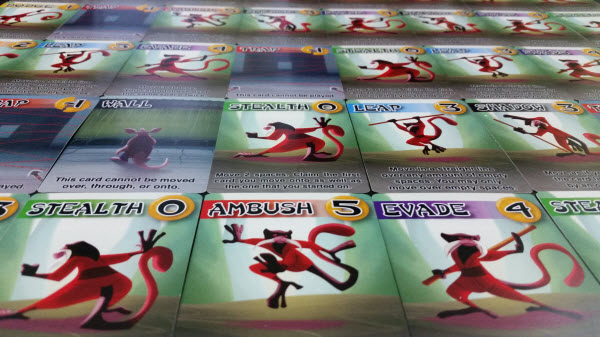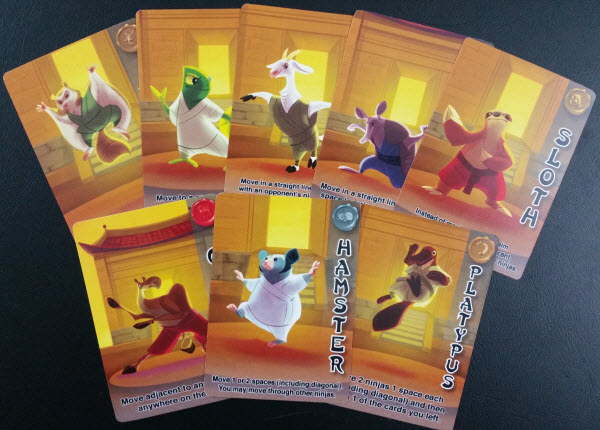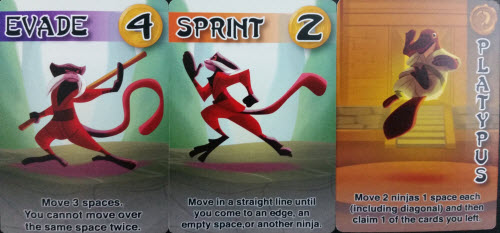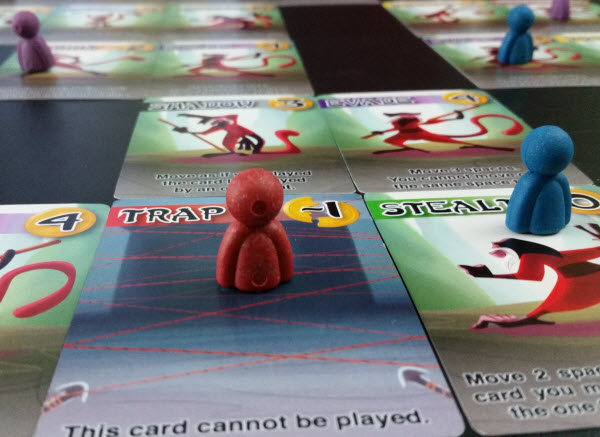Everybody was Kung Fu Fighting
Those kicks were fast as lightning
In fact, it was a little bit frightening
But they fought with expert timing…
The development, study, practice, and reverence of martial arts have been a staple part of many Asian countries for centuries, some techniques of which go back thousands of years. More than simply being defensive fighting styles, martial arts are usually a refined mix physical training, mental clarity, and often, some manner of spiritual pursuit. The most robust among these are the Chinese martial arts, known to us as Kung Fu. Yet Kung Fu isn’t just one fighting style. There have been, quite literally, hundreds of Kung Fu styles. Of those, some of the most famous are the Shaolin animal forms.
You’ve probably heard of several of them: the crane. The dragon. The tiger.
And coming soon…the Hamster?
Yes , this is potentially possible as we enter Ninja Camp, the short and sweet new card game by Action Phase Games. In this 2-4 player test of mental fortitude and physical prowess, a variety of animal groups have gathered at a martial arts training camp to compete with one another over the rights to have a new fighting style named after them. Thus, the game begins with each player randomly receiving a Clan card as you become one of the game’s hearty contenders. These contenders, in fact:
We’re rooting for either the Sloth or Platypus. Because either of them sure could use a win one of these days.
No matter which Clan you’re chosen to represent, however, each animal comes with its own Clan power that you can tap into once per game. Showing off your animal tenacity and whatnot.
Before the game is fully underway, two things quickly jump out about Ninja Camp. The first is that although it’s almost entirely card-based, it requires a fair amount of play space. This is because the game takes place as a randomized grid of cards containing varying amounts of the seven different kinds of movement cards found in the game (Ambush, Evade, Dodge, Leap, Shadow, Sprint, and Stealth), as well Walls and Traps, which are there to thwart you and your stunning animal prowess.
The second immediate reaction to Ninja Camp will be how easily to grasp the rules are. Ninja Camp is designed to be a lighter affair, with most games clocking in at around 20-25 minutes, and the rules adequately reflect that.
At the start of the game, everyone places three animal clan members in a boomerang-style fashion, wherein the last person to place their ninja starts the first turn. There are only two restrictions when it comes to placement: it can’t be on a Wall, and no ninja can ever be on the same card as another ninja.
As you’d expect with a game of this caliber, turns are both quick and easy to follow. First, you either play a card from your hand, use your one-time Clan power, or pass. Passing takes you out of the game entirely, reclusive monk style, and you generally only pass when you absolutely have to. So, most of the time you’re playing cards. When playing a card, however, you must be able to use one of your three clan members to do the played card’s effect in its entirety. A Leap card, for instance, lets you hop over empty spaces between cards, but it won’t do you any good if all your units are surrounded by cards.
Fear not, as everyone starts with a Sprint and an Evade card – two of the more versatile movement types in the game. You often only have two cards in your hand, but some Clan powers and Stealth cards can provide you with a larger hand size over the course of the game.
After you use a card or Clan power and move one of your figures accordingly, you then pick up the card that your ninja was standing on before they moved. On the one hand this replenishes your hand with a new card for future movement. On the other hand is what drives much of Ninja Camp’s inherent puzzle-like appeal: every card picked up creates a hole in the grid, increasing the difficulty of navigating around the board the longer the game continues
Beyond their movement capabilities, every non-Wall card in the game is worth points. To prove your Kung Fu mastery, you want to have the most points at the end of the game (which happens once every player passes). This includes both cards you’ve played as well as those still in your hand. The vast majority of these cards are positive, although Stealth cards are worth no points (since they help you draw additional cards). The exception to this are Trap cards. Traps are worth negative points and can’t be played. So, you usually don’t want to pick those up if you can avoid it. Hey, they are called Traps for a reason, after all.
Like real martial arts, however, the concept of this game is easier than the execution. Ninja Camp may be solidly in the Filler Game category, but that doesn’t mean it’s devoid of providing a worthy challenge. Indeed, much of Ninja Camp’s appeal rests with making short but disciplined moves as you attempt to maximize the number of points you can get. The further along Ninja Camp goes, the fewer empty or otherwise occupied spaces remain. This perpetually increases the scarcity of options, both ratcheting up tension and propelling the game towards its inevitable Clan competition conclusion. Things start out easy enough, but by the end of the game, Ninja Camp will make you pause and think a moment more than once over what move is your best option.
The one caveat with Nina Camp is small but should be noted: to ensure all ninjas proceed through the game with an equal chance at winning, it’s a necessity players to channel their martial arts training and maintain a slight bit of foresight when playin. With such a limited number of cards you can play at any given time, you need to continually balance which cards you want to pick up off the board for points with those you’ll be able to actually play. It is entirely possible, for instance, that early miscalculations can leave you with a pair of unplayable cards and an already-used Clan power early in the game. In that case, a player can be forced to end up passing (and therefore being eliminated) well before the rest of the players. Most of the time this is simply the result of a slight learning curve, but especially for being a game that has real potential as a family-friendly title, it is something to take stock of. Ninja Camp doesn’t seek to be punishing, but you can get stuck if you’re not careful. Like sparring with another Kung Fu master, it helps to plan a move or two ahead.
Ultimately, Ninja Camp feels very much like one part Kung Fun Panda and one part Tsuro, except that the card paths are disappearing rather than getting filled up. That is, it can be quite entertaining and it’s often over before you know it. The game does a decent job being both easy to teach and playable with a wide spectrum of people, from family style game settings to more tactical-minded gamers looking for a 20 minute means to scratch their strategic itch.
Ninja Camp mixes its friendly graphics with the tangible appeal of watching the board disappear before your eyes, and for those who like some light puzzle-solving decision-making, the resulting experience is as pleasant as it is short. That said, you certainly don’t have to be a black belt in strategy to enjoy Ninja Camp. In fact, you don’t need to know anything about Kung Fu itself at all. But being a Bruce Lee fan can’t hurt.
Several Clans wish to head to Ninja Camp to prove their potential and be immortalized with a new martial arts fighting style. They just may need a little help in getting there. That’s where you come in. If you’re up for helping one of these new Clans reach both inner peace and greater worldly renown, then be sure to head over to Ninja Camp’s Kickstarter and cast your lot with one of them.
We’re still shooting for Sloth or Platypus though.

Play us out, Po…
Prototype Shown
Photo Credits: Kung Fu Panda by Dreamworks Animation.






